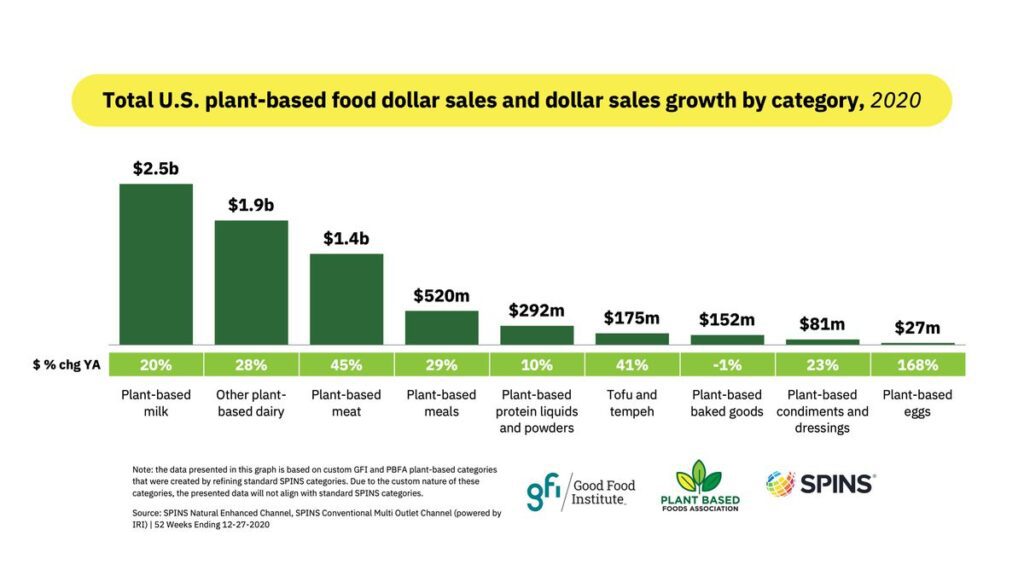The rise of plant-based proteins has been a significant trend in the food industry, driven by more people adopting vegetarian, vegan, or flexitarian lifestyles and concerns over the environmental impact of meat consumption. The market for plant-based proteins is valued at $4.5 billion and projected to reach $85 billion by 2030. Plant-based proteins are rich in nutrients, fiber, and vitamins, making them a healthy alternative to meat, and have a lower environmental impact. Retailers and restaurants have responded by offering a diverse range of products. While there are still challenges to overcome, the future of plant-based proteins looks bright as advances in technology make these products more affordable and taste better.
The Rise of Plant-Based Proteins: A Look at the Latest Food Trend
Introduction
In recent years, the rise of plant-based proteins in the food industry has been impossible to ignore. With more people adopting vegetarian, vegan or flexitarian lifestyles and concerns over the environmental impact of meat consumption growing, the demand for plant-based proteins has soared. This article explores the latest food trend of plant-based proteins and its impact on the industry.
The Market for Plant-Based Proteins
The market for plant-based proteins has been steadily increasing for several years. According to data from Nielsen, the sales of plant-based meat alternatives increased by 23% in 2018, and sales of plant-based milk alternatives have risen by 6% each year since 2012. The market is currently valued at $4.5 billion and is projected to reach $85 billion by 2030.
What are plant-based proteins?
Plant-based proteins include a variety of sources such as beans, legumes, nuts, seeds, and grains. These protein sources are rich in nutrients, fiber, and vitamins, making them a healthy alternative to meat. Plant-based proteins also have a lower environmental impact compared to animal-based proteins, making them attractive to environmentally-conscious consumers.
Plant-Based Proteins in Retail
Retailers have been quick to respond to the rise of plant-based proteins by offering a diverse range of products. Major supermarket chains including Tesco, Sainsbury’s, and Asda have all increased their plant-based offerings. In addition, specialist retailers such as Holland & Barrett have seen a significant increase in sales of plant-based products, with sales of vegan supplements and sports nutrition products, in particular, showing impressive growth.
Plant-Based Proteins in Restaurants
Restaurants have also started to incorporate plant-based proteins into their menus. Many fast-food chains, including Burger King and KFC, now offer plant-based burger alternatives, and high-end restaurants such as Noma in Copenhagen have even switched to entirely plant-based menus. This shift towards plant-based diets has been due, in part, to the rising demand for environmentally sustainable food products.
The Benefits of Plant-Based Proteins
There are several benefits to consuming plant-based proteins. Plant-based proteins are rich in nutrients and are a good source of fiber, vitamins, and minerals. They are also low in cholesterol and saturated fat, which can reduce the risk of heart disease. In addition, many experts believe that plant-based diets can help to prevent chronic diseases such as type 2 diabetes, obesity, and certain types of cancer.
The Environmental Impact of Plant-Based Proteins
Another benefit of plant-based proteins is their positive environmental impact. Animal agriculture is known to have a significant environmental impact, with greenhouse gases from livestock accounting for 14.5% of global emissions. By reducing meat consumption and transitioning to plant-based diets, individuals can significantly reduce their carbon footprint.
Challenges of Plant-Based Proteins
While the rise of plant-based proteins has been impressive, there are still several challenges that the industry must address. One of the main challenges is the cost of these products, with many consumers finding plant-based alternatives to be more expensive than their meat counterparts. In addition, there is still some reluctance among consumers to switch to a completely plant-based diet, with many concerned about the taste and texture of these products.
The Future of Plant-Based Proteins
Despite these challenges, the future of plant-based proteins looks bright. Advances in technology are making it easier for companies to create plant-based products that are more affordable and taste better than ever before. As consumers become increasingly aware of the environmental and health benefits of a plant-based diet, it is likely that demand for these products will continue to grow.
Conclusion
The rise of plant-based proteins in the food industry is a trend that is here to stay. With consumers becoming more aware of the benefits of plant-based diets for health and the environment, the demand for these products is set to keep growing. The industry must continue to innovate, address challenges, and prioritize sustainability to ensure that the trend continues to flourish.
